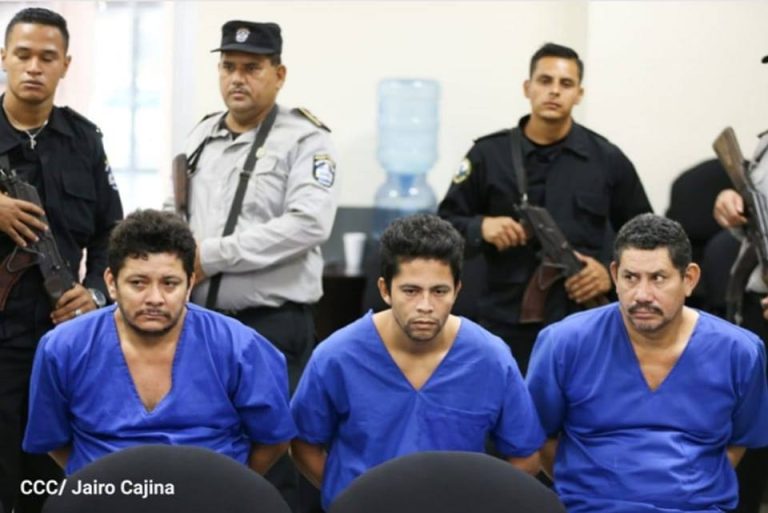9 de noviembre 2018

Children of Exile: The Births “Sowing Hope” in the Camp of Nicaraguan Farmers

PUBLICIDAD 1M
PUBLICIDAD 4D
PUBLICIDAD 5D
Conditions of political prisoners continues to be inhuman, without access to medical care and subjected to punishments

Conditions of political prisoners continues to be inhuman
Nicaragua’s Permanent Commission of Human Rights (CPDH) estimates the number of political prisoners of the regime of Daniel Ortega and Rosario Murillo to be over 600, with many accused under fabricated crimes linked to terrorism.
Meanwhile the government only verified 273 prisoners, in a report presented by Deputy Minister of Interior Luis Canas. [President Ortega said on Thursday that none of those are political prisoners but instead common criminals].
The Inter-American Commission on Human Rights (IACHR) and the Special Follow-up Mechanism for Nicaragua (MESENI) calculate that the Ortega government has at least 400 political prisoners scattered throughout the country’s different prisons and penitentiary system.
Around 315 have been accused and of those, the CPDH is representing at least 160. The Nicaraguan Center for Human Rights (CENIDH) counts 552 people imprisoned, among them 507 men, 40 women and 3 transgender people.
Medardo Mairena, peasant leader and political prisoner, was taken this Tuesday to the courts of Managua with Pedro Mena to begin their trial in which they are facing eight charges, including terrorism and murder. However, the hearing was suspended at the last moment and rescheduled for November 14 and 15, for the third time.
The peasant leader was able to meet with Julio Montenegro, lawyer of the Permanent Commission on Human Rights (CPDH), and talk about his health condition and the treatment in the prisons of the penitentiary system.
Montenegro was able to confirm, directly from Mairena, that he is not being subjected to physical torture, but he is being tortured psychologically. Mairena is in cell 300, known as “the little hell,” together with his colleague Pedro Mena, Silvio Pineda Bonilla and Orlando Pineda Icabalceta, all accused of terrorism, assassination, organized crime, kidnapping, aggravated robbery, damage to property, obstruction of public services and injuries.
The four detainees remain in a cell of four by six meters, in hot conditions, there is no light, poor air circulation and they are not taken out to take some sun, as all the other inmates of the penitentiary system. Their food is precarious noted Mairena.
The health condition of Mairena and Mena is another pending issue. According to Montenegro, the peasant leaders present several ailments, but the Penitentiary System has not registered or notified the courts on the situation of the prisoners and their defense cannot make the appropriate requests to deal with the illnesses of the accused.
Defense attorney Montenegro assures that the Penitentiary System carries out “simulations” of medical attention to male and female political prisoners. “They take people out, put them on a stretcher, feign that they are checking them, take photographs, videos and then return them to their normal state,” states the lawyer of the CPDH.
Montenegro together with the Inter-American Commission on Human Rights (IACHR) have tried to enter the cells of “El Chipote,” “La Esperanza,” and “La Modelo,” to verify the status of the male and female political prisoners, however, they have been denied access. The last time was on October 27 to verify the situation in “La Esperanza,” where 17 female political prisoners were beaten by a group of armed men with truncheons.
Although access was denied, Montenegro was able to confirm that the women in “La Esperanza” were beaten. Two women political prisoners from Matagalpa confirmed to the CPDH the assault and had bruises in their legs, arms and lips.
The trial against Mairena, Mena, Pineda and Icabalceta was postponed to November 14 and 15 at the request of the defense. Although the prosecution did not agree, the CPDH insisted on rescheduling so that a new defense counsel had adequate representation and the evidence at hand.
The rescheduling had been requested in writing since Monday, November 5, however the accused were taken to the Managua Courthouse without taking into consideration the request.
The witnesses presented in the case against Mairena and Mena are all on the government payroll. Montenegro states that a large number of police officers, investigators, experts, and other public employees add up to 75 witnesses by the Public Prosecutors’ Office. The defense has incorporated 10 witnesses who accredit the falsity of the accusations.
“What the Public Prosecutor’s Office says is not true, simply put because (Medardo) could not have been in two places at the same time. They are trying to establish that he with Francisca Ramirez were at the scene and that they were directing the attacks, they even present that Medardo had a revolver and those situations just do not match up,” says Julio Montenegro.
PUBLICIDAD 3M
PUBLICIDAD 3D